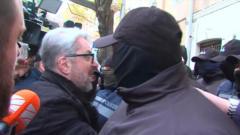In Tbilisi, the capital of Georgia, a wave of unrest is engulfing the nation as police brutally confront opposition leaders amid widespread protests advocating for European Union integration. Nika Gvaramia, a prominent leader from the Coalition for Change, was forcibly removed from his party's headquarters by police. This action comes in the wake of Prime Minister Irakli Kobakhidze's statement that those behind what he describes as a "violent" week of protests would be legally pursued.
Over the past week, anti-government demonstrations have surged after the ruling Georgian Dream party paused the country's efforts to initiate EU membership discussions. Hundreds of protesters have been arrested, with reports from human rights organizations revealing severe abuses within detention facilities, despite claims from the Georgian interior ministry citing injuries among law enforcement due to protester aggression.
In the midst of these tumultuous developments, Gvaramia emphasized that the activists had no choice but to rally on the streets to prevent Georgia from devolving into a "puppet territory" under Russian control. His foresight about impending police actions against opposition structures materialized less than 36 hours following his comments to the media.
The scene heightened on Monday evening when leaders from various opposition factions convened in a hotel to strategize a general strike and bolster their collaboration against the ruling party. However, the meeting concluded with several leaders, including well-known personalities like world champion wrestler Zurabi Datunashvili, encountering police aggressions as they exited.
The backlash against dissenters is evident, with numerous arrests reported, including members of the United National Movement and the Strong Georgia party. Additionally, homes of activists connected to pro-EU Facebook groups faced police raids, signaling an increase in state repression against civil society.
Gvaramia, previously imprisoned for alleged abuse of office and abruptly pardoned earlier this year, faces the current threat of renewed detention as the political environment shifts. Observations suggest that a growing fragmentation within Georgian Dream appears to be unfolding, highlighted by the resignation of key ambassadors and officials, including high-ranking members of the interior ministry.
As protests continue to unfold across Tbilisi and other cities, the public maintains a strong stance against what they perceive to be a dangerous pivot toward Russian influence, underscoring the urgent call for democratic integrity and European alignment.
Over the past week, anti-government demonstrations have surged after the ruling Georgian Dream party paused the country's efforts to initiate EU membership discussions. Hundreds of protesters have been arrested, with reports from human rights organizations revealing severe abuses within detention facilities, despite claims from the Georgian interior ministry citing injuries among law enforcement due to protester aggression.
In the midst of these tumultuous developments, Gvaramia emphasized that the activists had no choice but to rally on the streets to prevent Georgia from devolving into a "puppet territory" under Russian control. His foresight about impending police actions against opposition structures materialized less than 36 hours following his comments to the media.
The scene heightened on Monday evening when leaders from various opposition factions convened in a hotel to strategize a general strike and bolster their collaboration against the ruling party. However, the meeting concluded with several leaders, including well-known personalities like world champion wrestler Zurabi Datunashvili, encountering police aggressions as they exited.
The backlash against dissenters is evident, with numerous arrests reported, including members of the United National Movement and the Strong Georgia party. Additionally, homes of activists connected to pro-EU Facebook groups faced police raids, signaling an increase in state repression against civil society.
Gvaramia, previously imprisoned for alleged abuse of office and abruptly pardoned earlier this year, faces the current threat of renewed detention as the political environment shifts. Observations suggest that a growing fragmentation within Georgian Dream appears to be unfolding, highlighted by the resignation of key ambassadors and officials, including high-ranking members of the interior ministry.
As protests continue to unfold across Tbilisi and other cities, the public maintains a strong stance against what they perceive to be a dangerous pivot toward Russian influence, underscoring the urgent call for democratic integrity and European alignment.






















